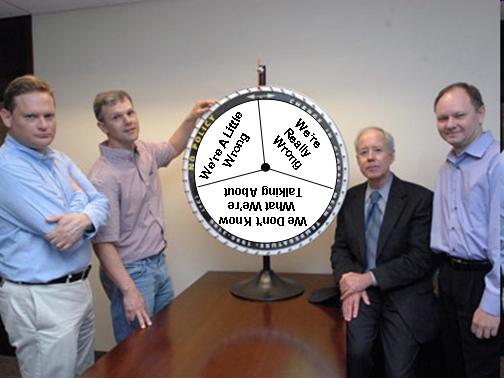
Now that I have opened the political Pandora’s Box, I might as well continue getting some of this off my chest.
Some people think that I hurt my scientific credibility by revealing my political views from time to time. Well, I don’t like politicians exploiting and ultimately destroying public faith in my scientific discipline (climate science) for their own political and financial gain.
We scientists will be sorry we ever allowed ourselves to be manipulated by powerful people who transformed what was a theoretical possibility for climate scientists, into a near certainty for public consumption.
While I firmly believe that the ultimate motivation behind the IPCC’s existence is not at all what they advertise it to be, I must admit the United Nations still has the upper hand: the theoretical possibility of catastrophic global warming (aka ‘climate change’).
As a scientist, I must admit that warming of 4 deg. C or more this century is theoretically possible. But it’s a little like concerns that the Large Hadron Collider will cause the Earth to be swallowed by a black hole when it is switched on.
Unlike particle physicists, climate researchers currently have no way to objectively determine the probability of dramatic changes like climate tipping points. At least when particle physicists talk probabilities, they are talking about real probabilities, based upon real observable events which are repeatable. The IPCC’s probabilities regarding one-of-a-kind events with uncertain causes (e.g. warming in the last 50 years) are no more than measures of their faith expressed in pseudo-scientific jargon.
And the people who write the Summary for Policymakers for the IPCC reports are masters at wordsmithing their documents to convey maximum alarm without resorting to outright falsehoods. How clever.
The fact that catastrophic warming will remain a possibility indefinitely allows the U.N. to continue its propaganda campaign.
Living is Risky
Modern fears of global warming and other perceived dangers to the consumer support my claim that our society is more risk adverse than any in history.
The very existence of the Precautionary Principle shows that even though every one of us weighs risks against benefits in every decision we make on a daily basis, some people can still dream up totally illogical reasons why humanity should stop doing this or that.
Never in history have so many advocates with so little common sense held so much influence over so selfish a political class who were elected by so gullible a public for such irrelevant reasons.
Living is risky. Get over it.
I’m sure that the IPCC’s embattled Grand Poobah, Rajendra Pachauri, flies in airplanes even though they might crash, crosses streets even though he might get run over, eats food even though he might choke to death, and writes vapid steamy romance novels even though he might be ridiculed.

Obviously, Pachauri weighs risks against benefits in his own life, as do we all. Please don’t insult our intelligence by demanding that we dismantle all coal-fired power plants and replace them with a million bird Cuisinarts (aka windmills).
Political Versus Climatic Tipping Points
We are endlessly fascinated by tipping points. The movie Day After Tomorrow involved a mini-Ice Age forming in a matter of days as a result of your SUV getting together with other SUVs after work and drinking too much at the local Exxon watering hole.
Scientists and engineers think of tipping points in terms of nonlinear relationships. A given forcing results in a certain response, but beyond a certain level of forcing the response grows dramatically. The future behavior of nonlinear systems is notoriously difficult to forecast.
The climate system is a nonlinear system. This doesn’t necessarily mean it has tipping points, but it sure doesn’t exclude the possibility either.
As long as people like James Hansen believe that the Ice Ages were the greatly amplified response to a weak forcing, they will be able to claim that our climate system has experienced tipping points in the past. No matter how long we go without significant warming, influential people like Hansen will still claim that it is only a matter of time before Mother Nature decides she has had enough, and turns the oven up from “warm” to “broil”.
As a result, there will always remain some science that can be used to justify the work of the IPCC.
The Future of the IPCC
The IPCC is now at a tipping point. Will its self-destruct? Probably not. Dramatic organizational changes will be instituted, and at some point success will be declared. The IPCC will be refocused, leaner, meaner, more transparent, more open to the views of the deniers…er…I mean skeptics.
But the ultimate purpose of the IPCC will remain unchanged: to cherry pick and misuse climate science in order to eventually control humanity’s access to energy.
So, in order to put the IPCC out of its misery, it will take more than to just point out its selective use of facts and its biased science. Its demise will have to be the result of political pressure related to its biased political agenda.
And at least in the U.S., the current indications are that the citizens have had just about as much as they can take from those whose (arguable) good intentions force others to pay for paving that proverbial road to hell.
 |

 Home/Blog
Home/Blog



